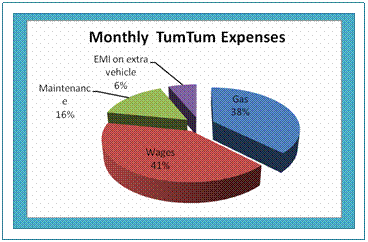The Tumtum
Vineet and Karthik highlight the urgent need for responsible student use of the Internal Transport Service
A BRIEF HISTORY
The need for a centralized internal transit system was felt when the use of private vehicles was banned at IIT Bombay. After having used jeeps, auto-rickshaws and LPG-powered white buses in the past, IIT Bombay needed a more concrete transport system that would cater
primarily to the student community.
IITB’s Tumtum service was modeled on the lines of IIT Madras’ campus transport system. The aim was to provide bus transport and facilitate commuting within the campus. It was well understood that the internal transit system was a facility for the students and the institute was not obliged to provide such a facility.
It was decided that the rolling stock would be bought by the institute and would be leased to an independent body called the Student Welfare Society. The society had to be registered under the Indian Societies Registration Act before it could begin its operations, and it was expected that would take some time.
To avoid delay, it was decided that the Security Section would be temporarily entrusted with the responsibility of operating the Institute’s internal transit system. The necessary funds for buying the rolling stock were sanctioned. Lots of effort went into obtaining the necessary permissions, registrations and approvals from the authorities outside IIT Bombay. A survey was conducted and it was found that a large number of students favoured the coupon system.
After some trial and test runs the highly awaited Tumtum service finally began its operations in August 2007.
OPERATIONS
The day to day operations of the tumtums are funded by cash collected through coupon sales and distribution of authorized monthly/quarterly passes.
The maintenance of vehicles is a major exercise on weekends. Often, the vehicle has to be sent to a standard workshop outside the campus, for necessary repair and replacement activities. Because of common cases of overload and overdrive, spare parts like clutch plates, brake shoes and shockers need to be replaced frequently. Interestingly, some parts like the road spring, which ordinarily don’t need replacement for the entire lifetime of a vehicle, had to be replaced within 8 months of operation. A consequence of the 8:30 tumtum overload, perhaps.
There are a total of 9 vehicles in service at the moment. All these vehicles run on CNG. CNG is not available during the night and hence all vehicles have to be necessarily refueled during the day. In order to avoid the interruption of services during the peak hours of morning, most of the vehicles are sent for refueling in the afternoon. The uncertain traffic conditions lead to an almost daily disruption of the schedule in the afternoon.
The Security Section is extremely cautious about the safety of students and it recruits drivers after an extensive background check. The strict requirements ensure that only the most competent drivers are hired. However, the drivers receive daily wages and their wages have to be at par with the institute norms for skilled labor. These wages are obviously not competitive enough. Although there are a total of 17 drivers, each one of them has a heavy workload of 8.5 hours per day. All these factors result in a substantially high attrition rate. The Security Section recently lost almost 40% of the drivers to BEST, where they were promised slightly higher wages and lesser workload. Loss of staff to lucrative opportunities elsewhere is quite common, but the Security Section is troubled by the fact that there is a serious lack of competent drivers. A large number of applicants even fail to produce the basic requirements for the job like a HSC qualification and a valid driving license.It is estimated that given the current demand, the institute needs 12 vehicles to avoid overburdening and disruption of schedule. The institute had spent over Rs. 1 crore and purchased a rolling stock of 8 vehicles. The 9th vehicle was purchased on a loan from the institute.
THE DARK SIDE
Authorities have pointed out that the Tumtum service is a facility which is being provided to the students at IIT Bombay on a non-profit basis. A lot of effort and resources have gone into initiating the system and, if this service becomes non-self sustainable at any point of time, then it will have to be discontinued.
So far, the Security Section has deftly managed the entire revenue and expense structure of the Tumtum system. After having successfully operated the service for more than a year, it is confident that the model is fully self-sustainable and will remain feasible for the years to come. There are minor issues like overloading of vehicles, the subsequent need for high maintenance and an ever increasing demand for internal transport, which can only be taken care of by purchasing more vehicles.
Another issue that must be of major concern to the whole student community of IITB is that of an increasing tendency to deliberately travel on tumtums without either a pass or a coupon. The staff at the Security Section is already pressed for time and is unable to take strict measures for vigilance and regular checking at stops. The only cases of ticketless travel that come to the surface are those reported by the tumtum drivers upon seizure of forged and expired passes. In September 2008 alone there were more than 80 unauthorized passes that were confiscated. Effectively, 10% of the total authorized passes issued each month are misused by the students. These are just the official numbers. During peak hours there is a large number of such students who attempt ticketless travel and are not caught because the vehicles are overcrowded then, and the drivers have less time to question and examine each and every student.
Vineet Singh is a fourth year student of the Mechanical Engineering Department. Karthik Ramesh is a third year student of the MEMS Department. They can be contacted at vineetsingh@iitb.ac.in and rkarthik@iitb.ac.in respectively


